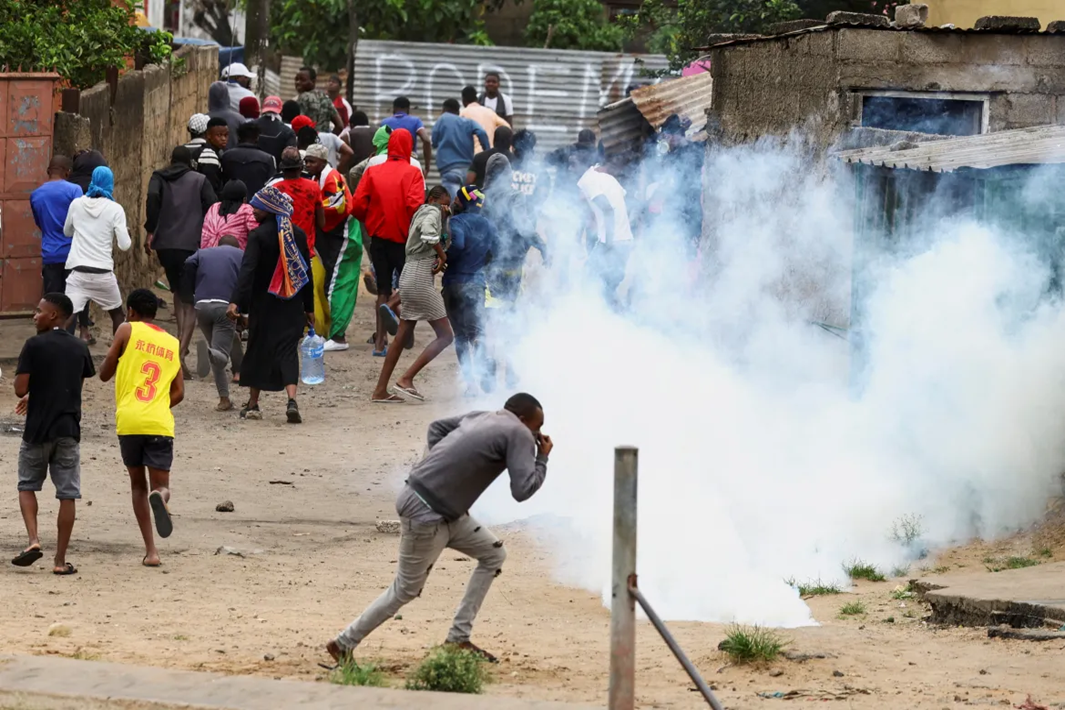By Paschal Norbert
MAPUTO, NOVEMBER 8, 2024 (CISA) – Tensions have reached a boiling point in Mozambique as protests against the long-ruling Frelimo party, which has held power for nearly five decades, escalate across the country.
On November 7, the capital city of Maputo saw its largest protest yet, with thousands taking to the streets protesting against the ruling party and the elections, which the opposition has said were fraudulent. Police responded with tear gas in an attempt to disperse the crowds, which included students, civil society groups, and other citizens demanding democratic reforms. The air was thick with tension as shopfronts, banks, and schools remained closed, and the normally bustling city appeared eerily deserted under the heavy presence of armed security forces.
Anger erupted after the October 9 election results declared Frelimo’s candidate, Daniel Chapo, the winner, sparking widespread allegations of vote rigging. Independent candidate Venancio Mondlane, who came in second, had garnered significant support among the youth and has led calls for nationwide demonstrations against the disputed election.
From an undisclosed location, Mondlane, a charismatic 50-year-old former radio presenter, spoke defiantly about the growing movement.
“I feel that there is a revolutionary atmosphere … that shows that we are on the verge of a unique historical and political transition in the country,” Mondlane told reporters.
Although authorities have sought to suppress dissent by restricting internet access and blocking social media platforms, the unrest continues to gain momentum. A situation in which Human Rights Watch condemned the government’s efforts to stifle public discourse, describing it as a blatant violation of citizens’ rights.
According to reports, police crackdowns on protests have resulted in the deaths of at least 20 people, though local organizations claim the death toll may exceed 50. The United Nations High Commissioner for Human Rights, Volker Turk, has urged Mozambique’s security forces to exercise restraint, cautioning against the use of “unnecessary or disproportionate force.”
Yet, as the protests intensify, authorities have hinted at deploying the military to regain control, particularly in opposition strongholds.
Amid the escalating chaos, Mozambique’s Catholic Bishops have emerged as powerful voices advocating for peace and justice. Following the murder of two opposition figures during the post-election protests, the Episcopal Conference of Mozambique (CEM) issued a strong statement condemning the violence and calling for an end to the political bloodshed.
“Violence was once again used after the election, culminating in a cowardly ambush, aimed at silencing democracy and truth,” the bishops declared.
The killings, which occurred on October 19, further inflamed tensions, especially among supporters of opposition-backed independent candidate Venancio Mondlane and formed the ground for the ongoing street protests.
In their statement, the bishops highlighted a disturbing pattern of violence against political figures, particularly from opposition parties, in the aftermath of elections.
“We strongly denounce the barbaric killings, which bear a resemblance to previous murders of political figures in the country’s past elections,” the CEM members stated.
Despite maintaining a neutral stance in the political sphere, the Catholic Church reaffirmed its commitment to promoting justice and democracy.
“The Catholic Church is non-partisan, but we are committed to the path toward a more democratic, inclusive, and just society, where everyone can live in peace and dignity,” the bishops emphasized. They also lamented the chaotic atmosphere, citing reports of election irregularities and voter intimidation.
Civil society groups, including the Mozambique Bar Association, have also expressed concerns that the situation could deteriorate into widespread violence.
“There are conditions for a bloodbath,” a spokesperson warned, pointing to the heavy-handed response of security forces and the government’s refusal to address grievances over the alleged electoral fraud.
The protests have extended beyond Maputo, with demonstrators clashing with police in other major cities. In some areas, protesters have set fires and attacked offices of the ruling party. Neighbouring South Africa, concerned about the growing unrest, has temporarily closed its border with Mozambique and increased its security presence.
The European Union’s observer mission also noted serious irregularities during the election, citing instances of altered results and the presence of Frelimo loyalists at polling stations. The Constitutional Council, Mozambique’s highest authority on election law, has since asked the electoral commission for an explanation regarding these discrepancies. However, opposition leaders remain sceptical that any investigation will be conducted transparently.
As Mozambique grapples with the worst post-election violence in recent history, calls for dialogue and reconciliation are growing louder. Yet, with the government refusing to budge, the atmosphere remains tense.
“The violence has plunged everyone into chaos, and we cannot fail to speak out against this injustice,” the Catholic Bishops stated, urging for a peaceful resolution to the crisis.
However, for many Mozambicans, the protests represent not just a rejection of Frelimo’s decades-long grip on power but a broader demand for change in a country where economic inequality and corruption have persisted.
“We are not just fighting for an election result; we are fighting for our future,” said one young protester in Maputo, echoing the sentiment of many who see this moment as a turning point.
